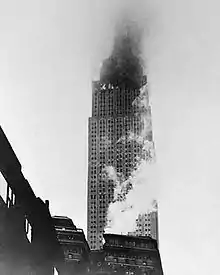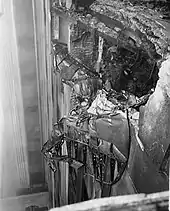1945 Empire State Building B-25 crash
On July 28, 1945, a B-25 Mitchell bomber of the United States Army Air Forces crashed into the Empire State Building in New York City, while flying in thick fog. The accident caused the death of fourteen people (three crewmen and eleven people in the building) and damage estimated at US$1 million (equivalent to about $14M in 2019), although the building's structural integrity was not compromised.[1]
 The Empire State Building on fire following the crash | |
| Accident | |
|---|---|
| Date | July 28, 1945 |
| Summary | Controlled flight into terrain (building) in inclement weather conditions (fog). |
| Site | Empire State Building, New York City |
| Total fatalities | 14 |
| Aircraft | |
| Aircraft type | B-25 Mitchell |
| Aircraft name | Old John Feather Merchant |
| Operator | United States Army Air Forces |
| Registration | 41-30577 |
| Flight origin | Bedford Army Air Field Bedford, Massachusetts |
| Destination | Newark Metropolitan Airport |
| Occupants | 3 (flight crew members) |
| Fatalities | 3 |
| Survivors | 0 |
| Ground casualties | |
| Ground fatalities | 11 |
Details

On Saturday, July 28, 1945, Lieutenant Colonel William F. Smith Jr. was piloting a B-25 Mitchell bomber on a routine personnel transport mission from Bedford Army Air Field in Massachusetts to Newark Metropolitan Airport in New Jersey.[2][3][4] Smith asked for clearance to land, but he was advised of zero visibility.[5] Proceeding anyway, he became disoriented by the fog and turned right instead of left after passing the Chrysler Building.[6]
At 9:40 a.m., the aircraft crashed into the north side of the Empire State Building, between the 78th and 80th floors, making an 18-by-20-foot (5.5 m × 6.1 m) hole in the building[7] into the offices of the War Relief Society and the National Catholic Welfare Council. One engine shot through the south side opposite the impact and flew as far as the next block, dropping 900 feet (270 m) and landing on the roof of a nearby building and causing a fire that destroyed a penthouse art studio. The other engine and part of the landing gear fell down an elevator shaft. The resulting fire was extinguished in 40 minutes. The Empire State Building fire is the only significant fire at such a height to be brought under control by firefighters.[7]
Between 50 and 60 sightseers were on the 86th floor observation deck when the crash happened. Fourteen people were killed: Colonel Smith, Staff Sergeant Christopher Domitrovich, and Navy Aviation Machinist's Mate Albert Perna, who was hitching a ride, and eleven civilians in the building.[1] Perna's body was not found until two days later, when search crews discovered that it had entered an elevator shaft and fallen to the bottom. The other two crewmen were burned beyond recognition.[8] Elevator operator Betty Lou Oliver was thrown from her elevator car on the 80th floor and suffered severe burns. First aid workers placed her on another elevator car to transport her to the ground floor, but the cables supporting that car had been damaged in the incident, and the car fell 75 stories, ending up in the basement.[9] Oliver survived the fall but had a broken pelvis, back and neck when rescuers found her amongst the rubble.[10] This remains the world record for the longest survived elevator fall.[6]
Despite the damage and loss of life, the building was open for business on many floors on the next Monday morning, less than 48 hours later. The crash spurred the passage of the long-pending Federal Tort Claims Act of 1946, as well as the insertion of retroactive provisions into the law, allowing people to sue the government for the accident.[10]
In popular culture
The events of the crash were the subject of an episode of the History channel documentary Disasters of the Century, entitled "It Came from the Sky". The documentary was made in 2001.
See also
References
- "Empire State Building Withstood Airplane Impact". JOM (monthly publication of The Minerals, Metals & Materials Society). 2001.
- Berman, John S. (2003). The Empire State Building: The Museum of the City of New York. Barnes, John & Noble Publishing. p. 85. ISBN 978-0-7607-3889-4.
- Barron, James (July 28, 1995). "Flaming Horror on the 79th Floor; 50 Years Ago Today, in the Fog, a Plane Hit the World's Tallest Building". The New York Times. Retrieved November 17, 2012.
- Byers, Roland O. (1985). Flak dodger: a story of the 457th Bombardment Group, 1943–1945, 8th AAF. Pawpaw Press.
- Richman, Joe (July 28, 2008). "The Day A Bomber Hit The Empire State Building". NPR.
- "Longest Fall Survived In An Elevator". GuinnessWorldRecords.com. Archived from the original on March 17, 2006.
- Molnar, Matt. "On This Day in Aviation History: July 28th". NYCAviation. Retrieved 2009-07-28.
- "B-25 Empire State Building Collision". Aerospaceweb.org. Retrieved April 8, 2012.
- Lynch, Patrick (11 October 2017). "This Woman Cheated Death Twice on the Same Day After a 1945 Disaster". HistoryCollection.co. Retrieved 11 May 2020.
- Joe Richman (July 28, 2008). "The Day A Bomber Hit The Empire State Building". NPR. Retrieved July 28, 2008.
Eight months after the crash, the U.S. government offered money to families of the victims. Some accepted, but others initiated a lawsuit that resulted in landmark legislation. The Federal Tort Claims Act of 1946, for the first time, gave American citizens the right to sue the federal government.
External links
- On This Day in Aviation History: July 28th – NYCAviation
- Plane Hits Empire State Building on YouTube
- Bomber Crash into Empire State Building, engineering case study calculating the impact force of the bomber (Archived from the original on 2004-07-15. Retrieved 2016-06-26.)
- The short film Stillman Fires Collection: Empire State Building is available for free download at the Internet Archive
- Empire State Crash – Video produced by the PBS Series History Detectives